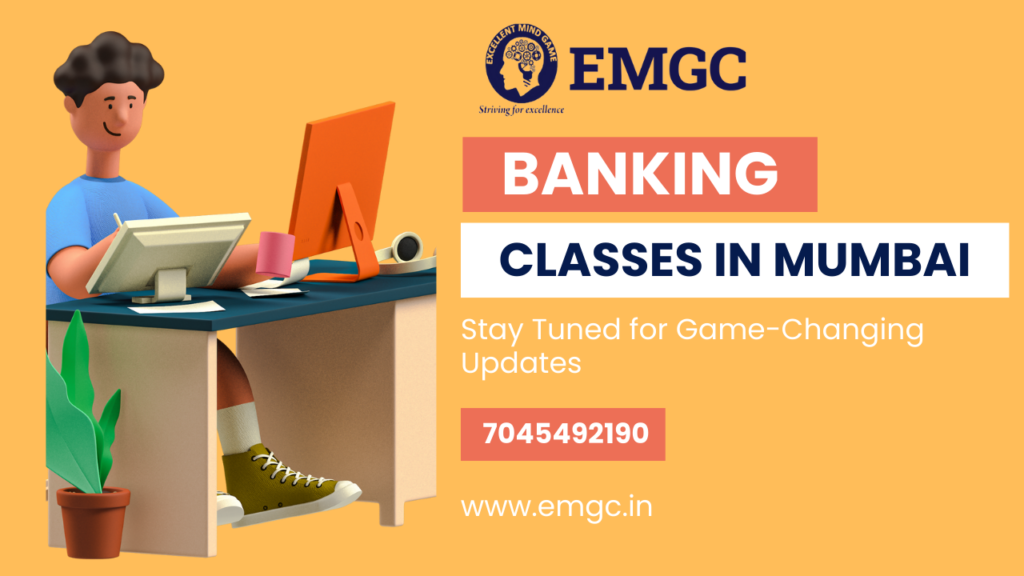
A Beginner’s Guide to Banking Exam Format
If you’re planning to pursue a career in banking, understanding the banking exam format is your first crucial step. These exams serve as the gateway to coveted positions in public and private sector banks. This beginner’s guide will provide a comprehensive overview of the format, strategies for success, and why EMGC Coaching Classes in Vasai, Mumbai, is the ideal partner for your banking exam preparation.
What is a Banking Exam?
Banking exams are competitive tests conducted to recruit candidates for various positions like Probationary Officer (PO), Clerk, and Specialist Officer (SO) in banks. Major exams include IBPS PO, SBI PO, RBI Grade B, and others. These exams evaluate your aptitude, reasoning, and professional knowledge.
Key Features of Banking Exam Format
1. Stages of the Banking Exam
Banking exams are typically conducted in three stages:
Preliminary Examination (Prelims):
The first step is the qualifying round, consisting of multiple-choice questions. The primary goal is to shortlist candidates for the main exam.Main Examination (Mains):
The Mains is more comprehensive, testing candidates on various subjects, including data analysis, general awareness, and English language.Interview Round:
For specific positions like PO or SO, an interview follows the Mains to assess communication skills and banking knowledge.
2. Subjects Covered
The subjects usually included are:
Quantitative Aptitude:
This section assesses your mathematical ability, covering topics like arithmetic, algebra, data interpretation, and probability.Reasoning Ability:
Logical puzzles, seating arrangements, coding-decoding, and blood relations are common topics in this section.English Language:
Focuses on grammar, vocabulary, reading comprehension, and error spotting.General Awareness (GA):
Includes current affairs, banking terms, and economic developments.Computer Knowledge:
Basic understanding of computer systems, MS Office, and internet usage.
3. Time Management
Each section is allocated a specific time limit, requiring efficient time management to maximize your score. For instance, Prelims generally last for 1 hour, while Mains can extend to 3 hours.
Preparation Tips for Banking Exams
1. Create a Study Plan
Divide your preparation time effectively. Allocate more time to weaker areas while revising strong subjects regularly.
2. Take Mock Tests
Mock tests simulate the exam environment, helping you identify areas for improvement and track progress.
3. Focus on Accuracy
Negative marking is a significant factor in banking exams. Aim for accuracy to avoid losing marks for incorrect answers.
4. Stay Updated
Read newspapers, follow financial news, and stay informed about current affairs to excel in the GA section.
Why Choose EMGC Coaching Classes in Vasai, Mumbai?
At EMGC Coaching Classes (Excellent Mind Game Coaching), we understand the nuances of banking exams and provide personalized training to help aspirants achieve their dreams. Here’s why we’re your best choice:
Expert Faculty
Our experienced faculty members are specialists in their respective fields, ensuring that you get top-notch guidance.
Comprehensive Study Material
We provide meticulously crafted study materials that cover all topics with the latest exam patterns in mind.
Regular Mock Tests
Our regular mock tests and performance analysis help students build confidence and identify improvement areas.
Individual Attention
With small batch sizes, we ensure every student receives personalized attention.
Proven Track Record
Many of our students have successfully cleared banking exams and secured positions in top banks.
For more information, contact us:
FAQs About Banking Exams
1. Can I prepare for banking exams without coaching?
Yes, self-study is possible, but coaching institutes like EMGC (Excellent Mind Game Coaching) provide structured guidance and expert mentorship, which can significantly enhance your preparation.
2. What is the eligibility for banking exams?
Eligibility varies by exam, but typically, candidates must have a bachelor’s degree and fall within the age range of 20–30 years.
3. How can I improve my speed in quantitative aptitude?
Practice regularly, focus on shortcuts, and use mock tests to improve speed and accuracy.
4. What books are recommended for banking exams?
Standard books like Quantitative Aptitude by R.S. Aggarwal and Word Power Made Easy by Norman Lewis are excellent resources. However EMGC (Excellent Mind Game Coaching) is having its own collection of books for banking exam preparation.
Conclusion
Banking exams demand dedication, strategic preparation, and expert guidance. By understanding the format and following a structured approach, you can ace these competitive exams. EMGC Coaching Classes in Vasai, Mumbai, is here to support you every step of the way, from mastering concepts to building exam confidence.
Contact us today and take the first step toward a rewarding banking career!
Contact Us
Location: EMGC Coaching Classes, Vasai, Mumbai
Phone: : 7045493358
Email: info@emgc.in
Website: www.emgc.in

